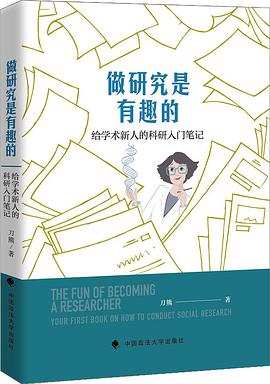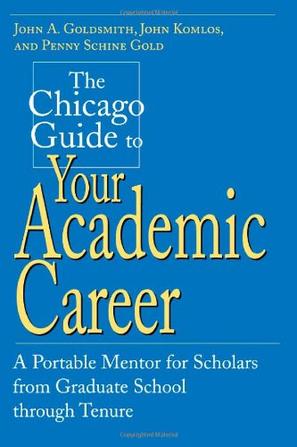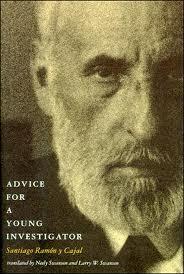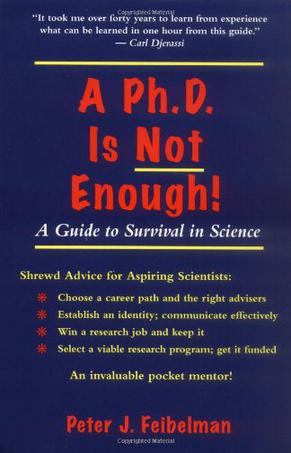-

做研究是有趣的
如何入手成为一个研究者?为什么要有社会科学研究?为什么做研究是有趣的工作?作为学术新人,我们该如何高效地读文献、做文献笔记、训练学术思维?如何看懂一篇实证研究?如何为自己的论文选题、如何正确地引用文献、如何合理地使用理论?国际期刊投稿的一般流程是什么?如何有效地参加国际会议和做学术报告?在美国读博士是怎样的体验?……
本书基于作者在美国读博士、做研究、从事教学的多年经验,以轻松、实用、近似于与朋友聊天的方式向读者阐述社会研究的底层逻辑、核心价值、操作方法,为学术新人提供入门社科类研究的基本思路和行动指南。
本书所探讨的如何读文献、写论文、设计研究等话题既适合于有志从事科研工作的本科生、硕士生、博士生和青年教师阅读,也适合于对世界和人类充满普遍好奇心、对社会科学拥有广泛兴趣的读者。书中展现了社科学者的日常、智识思考的乐趣、自我进阶的思索,非科研类读者将能通过了解社科研究的思路来升级个人思考世界的方法。
-

On Being a Scientist
The scientific research enterprise is built on a foundation of trust. Scientists trust that the results reported by others are valid. Society trusts that the results of research reflect an honest attempt by scientists to describe the world accurately and without bias. But this trust will endure only if the scientific community devotes itself to exemplifying and transmitting the values associated with ethical scientific conduct. On Being a Scientist was designed to supplement the informal lessons in ethics provided by research supervisors and mentors. The book describes the ethical foundations of scientific practices and some of the personal and professional issues that researchers encounter in their work. It applies to all forms of research--whether in academic, industrial, or governmental settings-and to all scientific disciplines. This third edition of On Being a Scientist reflects developments since the publication of the original edition in 1989 and a second edition in 1995. A continuing feature of this edition is the inclusion of a number of hypothetical scenarios offering guidance in thinking about and discussing these scenarios. On Being a Scientist is aimed primarily at graduate students and beginning researchers, but its lessons apply to all scientists at all stages of their scientific careers. -

科学研究的艺术
-

The Chicago Guide to Your Academic Career
With a perpetually tight job market, the road to an academic career can be a rocky and frustrating one. There are lots of questions, and this book attempts to provide good, frank answers to them. The three authors, with more than 75 years of combined academic experience, talk openly about what is good and what's not so good about academic life. The book provides information on finding a mentor, avoiding the pitfalls when writing a dissertation and negotiating job listings. The authors also discuss tough issues such as departmental politics, dual-career marriages and sexual harassment. There are also short essays that offer advice on financing graduate education, publishing your first book and leaving academia for the corporate world. -

Advice for a young investigator
Santiago Ramon y Cajal was a mythic figure in science. Hailed as the father of modern anatomy and neurobiology, he was largely responsible for the modern conception of the brain. His groundbreaking works were New Ideas on the Structure of the Nervous System and Histology of the Nervous System in Man and Vertebrates. In addition to leaving a legacy of unparalleled scientific research, Cajal sought to educate the novice scientist about how science was done and how he thought it should be done. This recently rediscovered classic, first published in 1897, is an anecdotal guide for the perplexed new investigator as well as a refreshing resource for the old pro. Cajal was a pragmatist, aware of the pitfalls of being too idealistic -- and he had a sense of humor, particularly evident in his diagnoses of various stereotypes of eccentric scientists. The book covers everything from valuable personality traits for an investigator to social factors conducive to scientific work. --from amazon -

A PhD Is Not Enough
Despite your graduate education, brainpower, and technical prowess, your career in scientific research is far from assured. Permanent positions are scarce, science survival is rarely part of formal graduate training, and a good mentor is hard to find. This exceptional volume explains what stands between you and fulfilling long-term research career. Bringing the key survival skills into focus, A Ph.D. Is Not Enough! proposes a rational approach to establishing yourself as a scientist. It offers sound advice of selecting a thesis or postdoctoral adviser, choosing among research jobs in academia, government laboratories, and industry, preparing for an employment interview, and defining a research program. This book will help you make your oral presentations effective, your journal articles compelling, and your grant proposals successful. A Ph.D. Is Not Enough should be required reading for anyone on the threshold of a career in science.